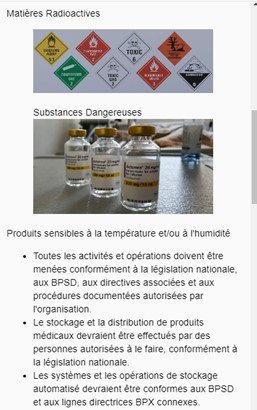Direct Support - Technical Assistance
The Laboratoire National de la Santé Publique (LNSP) in Cote d’Ivoire:
With funding from the USAID mission in Côte d’Ivoire, E-QP and our client, FHI 360, have collaborated to provide technical assistance to the country’s national testing laboratory, the Laboratoire National de la Santé Publique (LNSP) to strengthen the technical capacity of laboratory staff to monitor the quality of health products in Côte d’Ivoire.
The primary project objectives include:
1) strengthening the QMS of LNSP to become compliant with international standards (ISO 17025: 2017),
2) improving the technical capacity of LNSP to analyze antimalarial medicines (AMLs) included in the National Malaria Control Program treatment guidelines per international pharmacopeial standards, including training of the microbiology laboratory (Laboratoire de Biologie Médicale et de Microbiologie Industrielle et Alimentaire [LBMMIA]) staff on how to perform endotoxin analyses, and
3) training on hazardous waste disposal procedures including the identification, segregation, treatment, and disposal of hazardous and nonhazardous waste.
La Direction du Pharmacié et Médicament (DPM) of the Ministry of Health in Democratic Republic of Congo:
At the request of the USAID mission in the Democratic Republic of the Congo (DRC), FHI 360 and E-QP developed a workplan to deliver technical assistance to the DPM of the Ministry of Health in DRC focused on improving DPM’s ability to fulfill its mandate to regulate domestic pharmaceutical vendors (for-profit, not-for-profit, private, public, and faith-based) within the country. Particular attention was given to the regulatory functions for licensing establishments and regulatory inspections (functions five and six from the World Health Organization’s [WHO] Global Benchmarking Tool [GBT] for evaluation of national regulatory systems of medicines and vaccines). The specific activities of the TA included:
o Review of the current norms, regulations, standards, and tools that DPM uses to regulate pharmaceutical vendors in DRC
o Recommendations for addressing gaps in current documents and practices to ensure compliance with WHO Model Quality Assurance System for Procurement Agencies (MQAS) and WHO good storage and distribution practices (GSDP)
o A multiphase training program for DPM inspectors on methods of inspection of pharmaceutical vendors to verify compliance with WHO GSDP and/or MQAS
Training on inspection methods for WHO GSDP and/or MQAS was delivered both at a distance via an e-learning training program delivered to the inspectors’ mobile phones and in-person via training workshops and on-site observation of inspections conducted a third-party organization on behalf of USAID.
Rwanda Medical Supply, Inc. (RMS) in Rwanda:
The objective of the project, funded by the USAID mission in Rwanda, is to assist the procurement service agent (PSA) in becoming fully compliant with WHO Model Quality Assurance System for Procurement Agencies (MQAS). E-QP worked with RMS to develop a multiyear roadmap to address the deficiencies outlined in a baseline assessment by a third-party auditor to improve its compliance with MQAS.
Staff from E-QP traveled to Rwanda to present the roadmap to RMS and lay the foundation for developing new processes and approaches to build a strong QMS. This included the development of a robust document management system, a staff training program, and a complaint and deviation management system. E-QP also worked with RMS’s QA team to prioritize corrective actions that support the resolution of critical nonconformities from the baseline assessment, including cold-chain thermoregulation and prequalification of suppliers.
E-QP designed, developed, and deployed a distance-learning training course entitled “Introduction to the Model Quality Assurance System for Procurement Agents (MQAS)©” to RMS staff on their mobile phones that included principles of how to develop a quality management system and best practices for implementation. E-QP utilized the e-learning platform developed by Chalkboard Education because of its “offline” capabilities. While internet connectivity was required for the initial course download and for submission of quizzes and exams, the rest of the course could be completed offline, enabling learners in remote areas of Rwanda to participate, including those without access to reliable internet. Seventy percent of staff enrolled in the course completed the training program with scores above 80%. E-QP continues to work with RMS to address corrective actions outlined in the roadmap.
Testimonial from Chalkboard Education
〰️
Testimonial from Chalkboard Education 〰️

Technical Consulting
E-QP provides technical consultation services to public health consulting companies (ex: FHI 360, JSI, PFSCM) including services like development of product quality specifications, process reviews, standard operating procedure (SOP) development, supplier technical evaluations, complaint and incident management support, special projects, and waste management plan development and routine environmental monitoring.
E-QP collaborated with PFSCM on the development of the “CROSS COUNTRY SUMMARY REPORT LANDSCAPE ASSESSMENT OF HEALTH PRODUCT WHOLESALER AND DISTRIBUTOR CAPABILITIES AND OPPORTUNITIES IN FIVE COUNTRIES IN SUB-SAHARAN AFRICA” in 2019, funded by the Bill and Melinda Gates Foundation.









